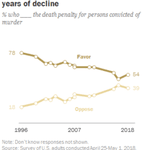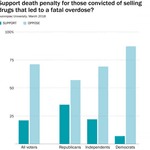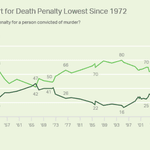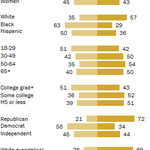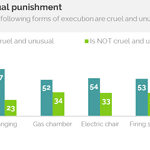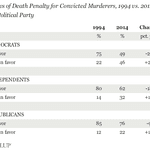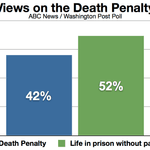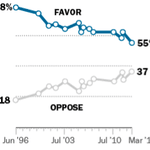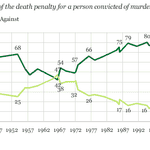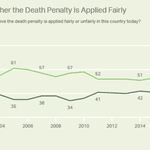
Public Opinion
National Polls and Studies
Decades of public opinion polling has shown significant changes in American views of the death penalty. In 1966, more Americans opposed the death penalty than favored it. After this point, death penalty support grew until the mid-1990s. Since that time there has been an overall downward trend in death penalty support. There has been an increased awareness of fairness and innocence concerns and public support of alternatives to the death penalty. A majority of Americans now say that alternatives to capital punishment are a better approach as punishment for murder.
DPI provides information on state, national, and international public opinion on the death penalty.
| Poll | Date | Issues |
|---|---|---|
| CrimeChannel.org | 11/24 | Slight Majority (54%) of Americans Believe the Death Penalty is Morally Acceptable |
| Gallup | 10/24 | Overall Support for the Death Penalty Remains at Five-Decade Low, 53% |
| Gallup | 5/24 | 55% of Respondents Believe Capital Punishment is Morally Acceptable |
| Gallup | 11/23 | Record Low 47% of Americans Think Death Penalty is Applied Fairly |
| Gallup | 5/23 | 60% of Respondents Believe Capital Punishment is Morally Acceptable |
| Gallup | 11/22 | Steady 55% of American Support Death Penalty for Murderers |
| Rasmussen | 11/22 | Less Than Half of Americans Support Death Penalty |
| Gallup | 6/22 | Americans Say Birth Control, Divorce Most ‘Morally Acceptable’ |
| Justice Research Group | 2/22 | The Modern American Death Penalty Is Massively Unpopular |
| Gallup | 11/21 | Public Support for Capital Punishment Remains at Half-Century Low |
| Frank Baumgartner, University of North Carolina | 8/21 | Index of Death Penalty Public Opinion Measures U.S. Support for Capital Punishment at Lowest Point Since 1960s |
| Pew Research Center | 4/21 | Pew Poll: Support for Death Penalty Declining, But Higher in Internet Polling than Phone Polling |
| Gallup | 11/20 | Public Support for the Death Penalty Lowest in a Half-Century |
| Gallup | 5/20 | Record-Low Percentage of Americans Now Find Death Penalty Morally Acceptable |
| Pew Research Center (as analyzed by Georgetown Public Policy Review) | 1/20 | Public Opinion on the Death Penalty: Where Republicans and Democrats Agree (And Disagree) |
| Gallup | 10/19 | A Record High 60% of Americans Prefer Life Sentence To Capital Punishment |
| Gallup | 10/18 | New Low of 49% in U.S. Say Death Penalty Applied Fairly |
| Pew Research Center | 6/18 | Support for Death Penalty Ticks Up, Though Still Near Historic Lows |
| Quinnipiac | 3/18 | Americans Overwhelmingly Oppose Death Penalty for Overdose Deaths |
| Gallup | 10/17 | Support for Death Penalty in U.S. at a 45-Year Low |
| Gallup | 10/16 | Support for Death Penalty at Lowest Level Since 1972 |
| Pew Research Center | 9/16 | Public Support for the Death Penalty Drops Below 50% for First Time in 45 Years |
| American Values Survey | 11/15 | A Majority of Americans Prefer Life Without Parole to the Death Penalty, According to the 2015 American Values Survey by the Public Religion Research Institute. |
| Gallup | 11/15 | Support for Death Penalty Declines 2%, Opposition Reaches Highest Level in 43 Years |
| Quinnipiac | 6/15 | Less Support For Death Penalty — Except For Terrorism |
| Pew Research Center; CBS Poll | 4/15 | National Polls Show Historic Declines in Support for Death Penalty |
| YouGov | 2/15 | Young People Divided on the Death Penalty |
| Public Policy Polling | 11/14 | Americans Oppose Executing Mentally Ill By 2‑to‑1 Margin |
| Gallup | 10/14 | Death Penalty Support Remains Near 40-Year Low |
| ABC News /Washington Post | 6/14 | Poll Finds Majority Support for Life in Prison Over Death Penalty |
| NBC News | 5/14 | Americans Weigh in on Lethal Injections |
| Royal Statistical Society | 3/14 | Support for Death Penalty Impacted by Region, Race, Support for Republican Presidential Candidate |
| Pew Research Center | 2/14 | Pew Poll Shows Drop in Death Penalty Support |
| Huffington Post | 1/14 | Americans Favor The Death Penalty, But Few Want The Executed To Suffer |
| Barna Group | 1/14 | Support for Death Penalty Low Among Christians |
| Gallup | 10/13 | 60% approval rating for death penalty lowest since 1972 |
| Gallup | 1/13 | U.S. Death Penalty Remains Near 40-Year Low at 63% |
| Pew Research Center | 1/12 | Support for Death Penalty at 62%, Near Low for Pew Research |
| CNN | 10/11 | Number who prefer death penalty on decline |
| Gallup | 10/11 | In U.S., Support for Death Penalty Falls to 39-Year Low |
| Rasmussen | 09/11 | 60% Still Favor Death Penalty |
| CBS News /New York Times | 09/11 | American support for death penalty lowest in 20 years |
| Lake Research Partners(for DPIC) | 11/10 | Growing Support for Alternatives to the Death Penalty |
| Lake Research Partners (for DPIC) | 11/10 | Same poll as above: Catholic respondents compared to country |
| Rasmussen | 06/10 | Death Penalty Opinion Poll, National |
| Gallup | 01/10 | Aggregate of previous polls |
| Gallup | 10/09 | Death Penalty Support Steady |
| Gallup | 10/08 | Decline in Support for Death Penalty since 2007 |
| Harris Interactive | 3/08 | Finds Decline in Support for Death Penalty |
| National Christain Poll.com | 2/08 | Christian Support of Death Penalty |
| PEW Forum | 12/07 | Death Penalty Support Declines Since 1994 |
| Gallup | 10/07 | Death Penalty Support Steady |
| Death Penalty Information Center | 6/07 | Reasons for Declining Support of Death Penalty |
| Gallup | 6/07 | Less Support Among Whites and Blacks for Death Penalty |
| PEW Forum | 3/07 | Modest Decline in Death Penalty Support |
| Gallup | 10/06 | Death Penalty Support |
| Angus Reid Global Scan | 7/06 | U.S. Stable in Death Penalty Support |
| Gallup | 6/06 | Life Without Parole Support Growing |
| Angus Reid Global Scan | 3/06 | Majority in US Supports Death Penalty |
| Gallup | 2/06 | Comparing US, Great Britain and Canadian support |
| Gallup | 10/05 | Support for death penalty at lowest level in 27 years. |
| Gallup | 5/05 | Support for Death Penalty Remains the Same |
| CBS | 4/05 | Support Evenly Split Over Death Penalty Issues |
| WP/ABC News | 4/05 | Support for Death Penalty Stays Below 70% |
| Fox News/Dynamics | 4/05 | Support for Death Penalty Remains Low |
| Zogby | 3/05 | Rise in Catholic opposition to capital punishment |
| Criminology and Public Policy | 2/05 | innocence and the death penalty |
| Quinnipiac | 12/04 | declining support, support for Life Without Parole |
| Gallup Poll | 10/04 | declining support |
| Ayres McHenry | 5/04 | declining support |
| Gallup Poll | 5/04 | declining support, deterrent effects |
| Harris Poll | 12/03 | deterrence, declining support |
| ABC News | 12/03 | declining support for juvenile death penalty; sentencing for Lee Malvo in Virginia |
| Gallup Poll | 10/03 | declining support |
| Notre Dame Magazine | Summer 2003 | support for death penalty shaped by parish priest |
| Pew Research Center | 7/24/03 | declining support, juvenile death penalty, declining support among African-Americans, Hispanics, and Protestants |
| Fox News | 7/03 | declining support |
| Gallup Poll | 5/03 | support for death penalty, life without parole, wrongful executions (Read Gallup’s Press Release) |
| ABCNews/Washington Post | 1/24/03 | life without parole, support for Gov. Ryan’s clemency decision |
| Harris Poll | 1/17/03 | Support for Gov. Ryan’s clemency decision |
| Harris Poll | 11/02 | levels of support for death penalty for Beltway Sniper suspects |
| Gallup Poll | 10/02 | declining support, life without parole |
| Gallup Poll | 5/20/02 | declining support for executing juveniles or those with mental retardation, support for life without parole |
| ABCNews.com | 5/7/02 | support for the death penalty remains low after terrorists attacks |
| Pew Research Center | 3/02 | support for the death penalty remains low after terrorists attacks |
| Zogby International | 10/25 – 11/1/01 | Catholic support for the death penalty is evenly divided |
| Gallup Poll | 10/01 | support for the death penalty remains low after terrorists attacks |
| Harris Poll | 7/01 | declining support, deterrence, wrongful executions |
| USA Today Poll | 5/4/01 | declining support, life without parole, wrongful executions |
| ABC News | 5/01 | moratorium, racial and economic disparities, declining support, life without parole |
| Reuters/Zogby | 4/23 – 25/01 | declining support, McVeigh execution, racial discrimination |
| Peter Hart Research | 3/01 | declining support, life without parole, moratorium, DNA testing, adequate representation |
| Gallup Poll | 2/01 | life without parole, wrongful executions, racial and economic disparities |
| National Law Journal/DecisionQuest | 12/11/00 | fairness, jurors, life without parole, wrongful convictions |
| Peter Hart Research/American Viewpoint | 9/14/00 | adequate representation, DNA testing, moratorium |
| Harris Poll | 8/2/00 | declining support, wrongful executions |
| NBC News/Wall Street Journal | 7/27 – 28/00 | fairness, moratorium |
| CNN/USA Today/Gallup Poll | 6/30/00 | declining support, fairness, innocence, Texas’s death penalty |
| Newsweek | 6/1 – 2/00 | DNA testing, innocence |
| Gallup Poll | 3/30/00 | DNA testing, innocence |
| Gallup Poll | 2/24/00 | declining support, life without parole, wrongful executions |
| Gallup Poll | 2/8 – 9/00 | economic disparity |
| ABCNEWS.com | 1/19/00 | declining support, life without parole |
| Gallup Poll | 1/11/98 | Americans favored life over death for Terry Nichols |
| CNN | 1997 | death penalty for Timothy McVeigh |
| Time and Newsweek | 1997 | deterrence, vengeance, racial disparity |
National Polls
The Evolution of Public Opinion on Capital Punishment
Slight Majority (54%) of Americans Believe the Death Penalty is Morally Acceptable
This national poll by CrimeChannel.org found that 54% of Americans believe the use of the death penalty is morally acceptable, while 36% believe it is morally wrong. 60% of men and 48% of the women polled say the death penalty is morally acceptable. 64% of Republicans, 45% of Democrats, and 53% of Independents believe the death penalty is morally acceptable.
Of those polled, 65% said that each state should decide whether to have the death penalty. Only 38% of respondents believe that using the death penalty would reduce murders and shootings, while 15% think using the death penalty more would result in more murders and shootings, and 34% think it would have no effect on crime.
Overall Support for the Death Penalty Remains at Five-Decade Low, 53%
According to October 2024 polling from Gallup, support for capital punishment remains at a five-decade low in the United States. Overall, Gallup found 53% of Americans in favor of the death penalty, but that number masks considerable differences between older and younger Americans. More than half of young adults aged 18 to 43 now oppose the death penalty. Among those expressing political affiliation, support for the death penalty fell markedly in all groups and in all generations, with the exception of Republicans sixty and older, where support for the death penalty rose by 2%.

Since 2000, support for the death penalty among millennials (ages 28 to 43) has fallen 25%. Gallup only began collecting data on Gen Z over the past four years, but the spread between Gen Z and all other age groups is pronounced — 58% of Gen Z oppose the death penalty, compared to only 38% of baby boomers and the so-called “silent generation” (together comprising those over the age of 60). Support for the death penalty also fell among this older cohort, but only by about 6% since 2000.

Support for the death penalty has remained stable among Republicans over the past 25 years but has shifted among Democrats and Independents. Among Democrats 60 years old and older, support has fallen 11% since 2016. Support among younger Democrats dropped even further — 18% since 2016. Among Republicans, support for the death penalty increased by 2% (the only group in the Gallup poll to show an increase in support) while support among younger Republicans fell slightly, by 4%. The trend among Independents followed that of Democrats generally, but was not as marked, with support for the death penalty among older Independents falling by 6% and among younger Independents by 10%.
55% of Americans consider the death penalty morally acceptable
A May 2024 Gallup poll found that 55% of Americans believe the death penalty is morally acceptable, down five percentage points from the previous year. 39% of respondents said the death penalty is morally unacceptable.

Record Low 47% of Americans Think Death Penalty is Applied Fairly
The Gallup Crime Survey has asked for opinions about the fairness of death penalty application in the United States since 2000. For the first time, the October 2023 survey reports that more Americans believe the death penalty is applied unfairly (50%) than fairly (47%). This 47% represents a historic low in Gallup’s polling. The Gallup survey found that 53% of Americans favor the death penalty, the lowest number since March 1972, although not a statistically significant change from the 54% and 55% level of support recorded over the previous three years. 39% of respondents said that capital punishment is not used often enough, while 56% of respondents believe it is either imposed too often or about the right amount. There are also partisan differences. 62% of Republicans think that the death penalty is not imposed often enough, while 25% say it is imposed about the right amount. 52% of Democrats think that the death penalty is imposed too often, while 24% think it is used about the right amount. There is a greater divide among Independents, as 37% think that it is not used enough, 32% think it is used about the right amount, and 26% think it is used too often.
60% of Respondents Believe Capital Punishment is Morally Acceptable
Gallup’s Moral Issues Survey was administered in May 2023 against the backdrop of the Tree of Life Synagogue trial in Pittsburgh. Gallup reported a slight (5%) increase in the number of respondents who believe that capital punishment is morally acceptable, with 60% of individuals responding in the affirmative. The results of this survey have varied over the past two decades, reaching a high of 71% in 2006. Gallup reports that 82% of Republicans find the death penalty morally acceptable, compared to 59% of Independents, and just 40% of Democrats.
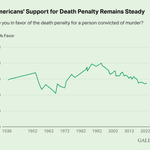
The 2022 Crime Survey by Gallup, administered between October 3 – 20, 2022 against the backdrop of the Parkland school shooting trial, reported support for capital punishment held steady at 55%, one percentage point above the 50-year low of 54% in 2021. Gallup has measured support for capital punishment at between 54%-56% for each of the past six years. 42% of respondents told Gallup they oppose the death penalty, one percentage-point below 2021’s 50-year high.
Support for capital punishment, which historically had tracked Americans’ fear of crime, did not materially rise despite the largest increase in fifty years in the number of U.S. adults who report that crime is up in the area in which they live. The spike in perceived crime was fueled primarily by a surge in fear among those identifying as Republicans, whose perception that local crime is rising increased from 38% in the final year of the Trump presidency to 73% at the approach of Biden midterm elections. Nationally, 56% of Americans told Gallup that local crime was up.
Gallup released the crime data October 28, 2022 and the death penalty data November 14, 2022.
Rasmussen: Less Than Half of Americans Support Death Penalty

This national poll by Rasmussen Reports found that fewer than half of American adults now support the death penalty. The Rasmussen poll, conducted in a telephone and online survey October 16 – 17, 2022 and released November 10, 2022, found that 46% of respondents who were asked “Do you favor or oppose the death penalty?” said they favor capital punishment. Twenty-eight percent of respondents told Rasmussen they oppose the death penalty and 26% said they weren’t sure.
The survey — also administered at the height of the American mid-term elections during a barrage of advertising that attempted to stoke voters’ fear of violent crime — nevertheless recorded a continuing decline in expressed support for capital punishment. Those saying they favored the death penalty fell by 17 percentage points from the 63% who favored capital punishment in Rasmussen’s June 2011 national survey. Death penalty support also fell by three percentage points from July 2019, when 49% of respondents told Rasmussen they favored the death penalty.
Rasmussen also asked death penalty supporters two follow-up questions related to the perceived length of time capital cases remain in the legal system. Nearly two thirds of death penalty supporters (64%) said they “favor carrying out death sentences in a more timely fashion.” 29% of those favoring the death penalty agreed with the statement that a “death sentence should be delayed as long as necessary to allow all legal appeals to be exhausted.” 7% said they weren’t sure.
The latest Rasmussen Reports national telephone and online survey finds that 46% of American Adults favor the death penalty, 28% oppose it, and 26% are undecided. Support for capital punishment has fallen slightly from 49% in July 2019 and is more than 15 points lower than the 63% who favored the death penalty in June 2011. (To see survey question wording, click here.)
Americans Say Birth Control, Divorce Most ‘Morally Acceptable’
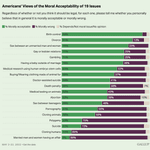
Gallup’s 2022 Values and Beliefs Survey, administered from May 2 – 22, 2022 and released in June 2022, showed that Americans’ support for capital punishment mirrors their views of its moral acceptability. Gallup found that 55% of Americans regarded the death penalty as morally acceptable, fractionally above the record low of 54% in the organization’s 2020 survey. The number matched the 55% level of acceptability reported in the 2021 Values and Beliefs survey.
Public support for capital punishment varies considerably depending upon the question that is asked. Gallup periodically asks respondents to choose whether the death penalty or life without possibility of parole “is the better penalty for murder.” The last time Gallup asked that question, in 2019, 60% percent of Americans chose the life-sentencing option, while only 36% favored the death penalty.
Justice Research Group: The Modern American Death Penalty Is Massively Unpopular
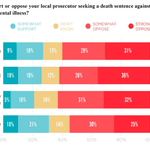
The poll released in February 2022 by the Justice Research Group found that Americans’ support for the death penalty was even lower when asked about the classes of defendants who are most frequently subject to the punishment. Democrats, Republicans, and Independents by margins of more than 30 percentage points opposed the use of the death penalty against people with severe mental illness, brain damage, or intellectual impairments, and against veterans with PTSD. The poll found pluralities of each group opposed to seeking the death penalty against victims of severe abuse, and Americans nearly evenly split on the propriety of the death penalty for adolescent offenders between the ages of 18 and 21.
The level of support for capital punishment mirrored recent years even in polls administered at the height of the American mid-term elections during a barrage of advertising that attempted to stoke voters’ fear of violent crime.
2021 Gallup Poll: Public Support for Capital Punishment Remains at Half-Century Low
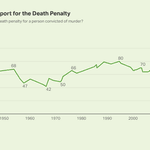
Public support for the death penalty again polled at a half-century low, with opposition remaining at its highest level since May 1966. Fifty-four percent of respondents to Gallup’s annual crime survey conducted between October 1 and October 19, 2021 told the polling organization that they were “in favor of the death penalty for a person convicted of murder.” The figure was the lowest since 50% of respondents in March 1972 told Gallup they favored the death penalty. Forty-three percent of respondents told Gallup that they were opposed to the death penalty as a punishment for murder, matching the responses reported in the 2020 death penalty poll. Opposition to capital punishment was the highest in 55 years, since 47% of Americans expressed opposition to capital punishment in the May 1966 Gallup survey.
Men said they were in favor of the death penalty, 59% – 38%. By contrast, 50% of women favored and 48% opposed capital punishment. Whites favored the death penalty 59% – 38%, compared to non-whites, who opposed capital punishment 53% – 45%. Respondents aged 18 – 34 opposed the death penalty 55% – 41%, while those aged 35 – 54 supported it 58% – 41% and Americans 55 and older from 63% – 35% in 2020 to 61% – 36% in 2021. Level of education also affected views on the death penalty. College graduates favored capital punishment 50% – 47%. Those with some college education and those with a high school education or less both supported the death penalty 57% – 41%.
The greatest differences in Americans’ views continued to be along partisan and ideological lines, though support fell among both left and right while rising in the center. 77% of Republicans favored the death penalty, while 22% opposed, a 5 percentage point shift from 2020 levels, when Republican favored the death penalty 82% – 17%. Democrats opposed the death penalty 66% – 34%, compared to 58% – 39% in 2020. Those identifying as Independents favored the death penalty 55% – 41% after narrowly opposed it in 2020, 50% – 49%. Those identifying as conservatives supported capital punishment 70% – 27%, down from 72% – 28% in 2020. Those identifying as liberal opposed the death penalty 69% – 28%, up from 67%– 32% in 2020. Those identifying as moderate supported the death penalty, 57% – 41%, up from 55%-42% in 2020.
Index of Death Penalty Public Opinion Finds Support for Capital Punishment in U.S. Lowest Since 1966
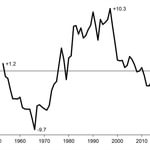
An analysis of 595 public opinion surveys administered between 1936 and May 2021 that asked respondents across the country about their attitudes towards capital punishment found that “Americans support capital punishment less than they have at any time since the modern death penalty system was established in 1976.” The polling analysis, conducted by University of North Carolina political science professor Frank R. Baumgartner, was published August 3, 2021 in the Washington Post. Using a mathematical technique called dyad ratios model, Baumgartner plotted the level of support for the death penalty over time.
Baumgartner set the baseline for his current index of support at the average of U.S. attitudes toward the death penalty from 1953 to 2021. In 1953, he says, support was “just above average,” falling over the next 13 years to 9.7 points below average in 1966, the low point in this period. Support for capital punishment then “trend[ed] unevenly but steadily upward to its high in 1997, with support for capital punishment nearly 20 points higher than in 1966,” at 10.3 points above average. However, Baumgartner writes, “public opinion toward the death penalty has soured even more quickly in the past two decades than it grew in the decades before,” declining to 9.2 points below average. Baumgartner found that support for capital punishment “has declined … to its lowest point since 1966.”
(Frank R. Baumgartner, If Biden abolishes the federal death penalty, he’ll have more support than you think, Washington Post, August 3, 2021.)
Pew Poll: Support for Death Penalty Declining, But Higher in Internet Polling than Phone Polling
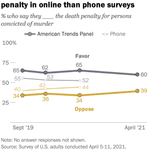
An April 5 – 11, 2021 on-line survey of U.S. adults by the Pew Research Center reported that support for the death penalty is down in the United States but may be higher than previous estimates because some poll respondents are unwilling to admit to a live pollster that they support capital punishment. The Pew poll reported that 60% of respondents said that they favored the death penalty, while 39% said they opposed it. Support declined and opposition increased by 5 percentage points from the responses by on-line respondents in Pew’s August 2020 and September 2019 surveys.
64% of respondents thought “the death penalty is morally justified” when a person “commits a crime like murder,” but respondents reported by a nearly four-to-one margin that the death penalty risks executing the innocent. 78% of respondents told Pew that “[t]here is some risk that an innocent person will be put to death,” while only 21% responded that “[t] here are adequate safeguards to ensure that no innocent person will be put to death.” “Only 30% of death penalty supporters — and just 6% of opponents — say adequate safeguards exist to prevent innocent people from being executed,” Pew said.
Respondents also disagreed that capital punishment contributes to public safety. 63% of on-line respondents told Pew that “the death penalty does not deter people from committing serious crimes,” compared to 35% who said they believed the death penalty was a deterrent. A majority of U.S. adults surveyed (56%) also said that “Black people are more likely than White people to be sentenced to death for committing similar crimes.” 41% said that “White people and Black people are equally likely” to receive the death penalty for similar crimes. The results reflected significantly different worldviews on this issue depending upon a respondent’s race. 85% of Black adults responded that Black people are more likely than Whites to be sentenced to death for similar crimes, falling to 61% of Hispanic adults and 49% of White adults.
2020 Gallup Poll — Public Support for the Death Penalty Lowest in a Half-Century
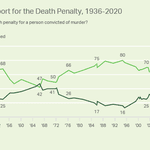
The 2020 annual Gallup poll on Americans’ attitudes about capital punishment, conducted between September 30 and October 15, 2020 and released in November, found that support for capital punishment was tied for the lowest in 48 years and opposition was higher than at any time since 1966. 55% of respondents told Gallup that they were “in favor of the death penalty for a person convicted of murder,” down one percentage point from the levels reported in 2018 and 2019 and tied with 2017 for the lowest support for capital punishment since Gallup’s March 1972 survey. Forty-three percent of respondents told Gallup that they were opposed to the death penalty as a punishment for murder, the most since 47% of Americans expressed opposition to capital punishment in the May 1966 Gallup survey.
Support for the death penalty has declined among all age groups, across race and ethnicity, and for individuals of every level of educational attainment over the past decade, Gallup reported. Additionally, Gallup suggested, demographic trends across the United States, “may lead to further erosion in death penalty support.” “Groups that are constituting a greater share of the U.S. adult population over time — including millennials and Generation Z, non-White adults and college graduates — all show below-average support for the death penalty,” Gallup Senior Editor Jeffrey M. Jones said. (Jeffrey M. Jones, U.S. Support for Death Penalty Holds Above Majority Level, Gallup, November 19, 2020.)
2020 Gallup Values & Beliefs Poll — Record-Low Percentage of Americans Now Find Death Penalty Morally Acceptable
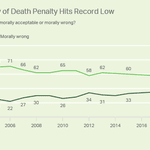
The May 2020 Gallup Values and Beliefs poll, released on June 23, 2020, found that the percentage of Americans who consider the death penalty to be morally acceptable has fallen to a record-low. According to Gallup, 54% of U.S. adults said the death penalty is morally acceptable, a six-percentage-point decline over the course of the last year and the lowest in the 20-year history of the poll. The results are 17 percentage points below the 71% of respondents who said in 2006 that the death penalty was morally acceptable. The percentage of Americans who said the death penalty is morally wrong reached a record high at 40%.
Gallup also measured views on the moral acceptability of the death penalty by political ideology. 56% of those who self-identified as moderates and 37% of liberals said they consider the death penalty to be morally acceptable, both were the lowest recorded since the poll began in 2001. 67% of conservatives said the death penalty is morally acceptable. Belief in the moral acceptability of capital punishment was down significantly among all ideological groups since its 21st century high point in 79% of conservatives, 68% of moderates, and 59% of liberals endorsed the moral acceptability of capital punishment. (Megan Brenan, Record-Low 54% in U.S. Say Death Penalty Morally Acceptable, Gallup News, June 23, 2020.)
January 2020 Pew Research Center poll — Public Opinion on the Death Penalty: Where Republicans and Democrats Agree (And Disagree)
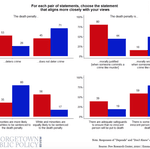
Despite partisan differences in overall support for capital punishment, Republicans and Democrats show significant overlap in their views on related issues of deterrence, innocence, and arbitrariness. A Georgetown Public Policy Review analysis of a January 2020 poll by Pew Research Center found that “[t]he controversy of this issue is not decisively split by party lines.” A majority (62%) of Democrats oppose or strongly oppose the death penalty, while a majority (75%) of Republicans support or strongly support it. However, when asked about specific justifications and concerns related to capital punishment, members of the two major parties showed commonalities.
Belief in the deterrent effect of capital punishment was stronger among Republicans (53%) than Democrats (26%), but Republicans were nearly evenly split on the question, with 45% joining most Democrats in the view that the death penalty does not deter crime. While four-fifths (80%) of Democrats thought racial minorities were more likely to be sentenced to death, more than a third (35%) of Republicans also held that view. Perhaps most strikingly, strong majorities of both parties (59% of Republicans and 79% of Democrats) were concerned that there was some risk of executing an innocent person.
2019 Gallup Poll — A Record 60% of Americans Prefer Life Sentence to Capital Punishment
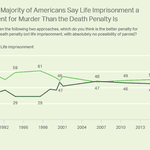
A record high 60% percent of Americans now say life without possibility of parole is a “better penalty for murder” than the death penalty. 36% favored the death penalty. It was the first time since Gallup began asking the question in 1985 that a majority of Americans chose the life-sentencing option. The response reflected a 15-percentage-point shift in American’s views towards capital punishment in just five years, which Gallup Senior Editor Dr. Jeffrey Jones, who conducted the survey, called “a pretty dramatic shift in opinion.” In his analysis of the poll results, Jones wrote, “all key subgroups show increased preferences for life imprisonment[, including] increases of 19 points among Democrats, 16 points among independents, and 10 points among Republicans.” In 2014, the last time Gallup asked the question, 50% said the death penalty was the better approach to punishing murder, while 45% preferred life in prison. For the second straight year, 56% of respondents told Gallup they were “in favor of the death penalty for a person convicted of murder,” the second lowest level of support for the death penalty in 47 years. 42% of respondents said they opposed the death penalty, a record high since the Supreme Court declared existing death penalty statutes unconstitutional in 1972 and the highest overall since May 1966. (Jeffrey M. Jones, Americans Now Support Life in Prison Over Death Penalty, Gallup, November 25, 2019.)
2018 Gallup Poll — Fewer than Half of Americans, a New Low, Believe Death Penalty is Applied Fairly
Fewer than half of Americans now believe the death penalty is fairly applied in the United States, according to the 2018 annual Gallup crime poll of U.S. adults, conducted October 1 – 10. The 49% of Americans who said they believed the death penalty was “applied fairly” was the lowest Gallup has ever recorded since it first included the question in its crime poll in 2000. The percentage of U.S. adults who said they believe the death penalty is unfairly applied rose to 45%, the highest since Gallup began asking the question, and the four-percentage-point difference between the two responses was the smallest in the history of Gallup’s polling. The poll also found that the percentage of Americans saying that the death penalty is imposed too often continued to rise and the percentage saying it is not imposed enough continued to decline. 57% of U.S. adults said the death penalty was imposed either “too often” (29%) or “about the right amount” (28%). By contrast, in 2010, 18% said the death penalty was imposed too often. 37% said the death penalty was not imposed enough, down 16 percentage points from the 53% level who in 2005 said it was not imposed enough.
Gallup measured overall support for capital punishment at 56%. Gallup analyst Justin McCarthy described that figure as “similar to [2017’s] 55%,” which, he said, “marked the lowest level of support for the practice since 1972.” He said “support for capital punishment … has been trending downward since peaking at 80% in the mid-1990s during a high point in the violent crime rate.” The poll measured opposition to the death penalty at 41%, the same as last year’s 45-year high. (Justin McCarthy, New Low of 49% in U.S. Say Death Penalty Applied Fairly, Gallup News, October 22, 2018; Gallup, Americans’ Views on the Death Penalty, 2018 (Trends), October 2018.)
2018 Pew Poll Finds Uptick in Death Penalty Support, Though Still Near Historic Lows
Just under 54% of Americans say they support the death penalty and 39% say they are opposed, according to the results of a Pew Research poll released June 11, 2018. The poll reflects a five-point increase in support for capital punishment — up from the record-low 49% recorded in Pew’s 2016 poll—but it is still the second-lowest level of death-penalty support recorded since the U.S. Supreme Court allowed executions to resume in 1976. Support for the death penalty remained lowest, and opposition highest, among Democrats (35% in favor, 59% opposed), Blacks (36% in favor, 52% opposed), and people with postgraduate degrees (42% in favor, 56% opposed). The highest levels of support for capital punishment were reported among Republicans (77% in favor, 17% opposed), White evangelical Protestants (73% in favor, 19% opposed), and men (61% in favor, 34% opposed). Women and the youngest voters (aged 18 – 29) were evenly divided on the issue, with 1% more saying they supported the death penalty. The largest shift since 2016 was among those identifying themselves as political independents, with reported support increasing from 44% in 2016 to 52%. Long-term trends, however, continued to show declining death-penalty support among all demographic groups. Support fell from 78% in 1996, to 64% in 2007, to 54% in 2018. That decline was sharpest among Democrats, whose support had dropped 36 percentage points since 1996, with support among Independents falling 25 percentage points during that period, and Republican support fallen 10 percentage points. (Baxter Oliphant, Public support for the death penalty ticks up, Pew Research, June 11, 2018; Mark Berman, American support for the death penalty inches up, poll finds, The Washington Post, June 11, 2018.)
POLL: Americans Overwhelmingly Oppose Death Penalty for Overdose Deaths
A March 16 – 21, 2018 nationwide Quinnipiac University poll found Americans of all ages, races, and political affiliations overwhelmingly opposed to the Trump administration plan to pursue capital punishment for drug overdose deaths and said they believed using the death penalty in those case would not help in fighting the opiod public health crisis. By a 50-percentage-point margin (71% to 21%, with 8% saying they did not know or would not answer), Quinnipiac respondents opposed the death penalty for persons convicted of selling drugs that contributed to a fatal overdose. Three-quarters of respondents (75%-20%-5%) said that using the death penalty for drug sales leading to overdose deaths will not help stop the opioid crisis. Opposition was strong even from the President’s own party, as nearly three-fifths of Republicans (57%) both opposed the administration’s plan and thought it would not work. Opposition to the use of the death penalty for drug-overdose sales was highest among African Americans (90%), Democrats (87%), voters aged 18 – 34 (82%), and college-educated Whites (77%). 73% of women and 70% of men opposed the plan, as did 69% of Whites, Hispanics, and Independents. By margins of more than 3 to 1, men and women, Blacks and Whites, and Democrats and Independents also said using the death penalty would not help stop the opiod crisis. Hispanics by a margin of 2 to 1 thought it would not work.
In its survey of 1,291 American voters, the Quinnipiac Poll also asked several questions about the death penalty itself. In response to the question, “Do you support or oppose the death penalty for persons convicted of murder?,” 58% said they supported capital punishment, while 33% opposed. When asked “Which punishment do you prefer for people convicted of murder: the death penalty or life in prison with no chance of parole?,” 51% said they preferred life without parole, versus 37% who preferred capital punishment. This was the first time since the poll began asking this question in 2004 that a majority of Americans said they preferred the life-sentencing option. At the same time, however, poll respondents said by a 2 to 1 margin that they would not like to see the death penalty abolished nationwide. Democrats split on that question at 47%-46% in favor of abolition, but substantial majorities of every other demographic opposed abolition. “It’s a mixed message on a question that has moral and religious implications,” said Tim Malloy, the assistant director of the Quinnipiac University Poll. “Voters are perhaps saying, ‘Keep the death penalty, but just don’t use it.” (Most U.S. Voters Back Life Over Death Penalty, Quinnipiac University National Poll Finds; Voters Back Anti-Gun March 2 – 1, But Say It Won’t Work, Quinnipiac University Poll, March 22, 2018; Phillip Bump, Republicans oppose Trump’s death-penalty-for-dealers plan — and don’t think it would work, Washington Post, March 22, 2018; Max Greenwood, Most oppose Trump’s call for death penalty for drug dealers, The Hill, March 22, 2018. Polling graphics by the Washington Post.)
2017 Gallup Poll Reports Support for Death Penalty in U.S. at a 45-Year Low
The October 2017 Gallup Poll on capital punishment found that “Americans’ support for the death penalty has dipped to a level not seen in 45 years.” Gallup reported that 55% of Americans said they supported the death penalty for a person convicted of murder, down from a reported 60% in October 2016 and the lowest level of death-penalty support since March 1972. Gallup said the five percentage-point decline — which represented an 8% decrease in the level of support for the death penalty nationwide over the course of the last year — “continue[s] a trend toward diminished death penalty support” in the United States. The poll also reported opposition to the death penalty at 41%, the highest level in 45 years. The last time Gallup reported higher opposition to the death penalty was 51 years ago, in May 1966, when 47% of respondents said they opposed capital punishment. The 2017 Gallup results simultaneously reflected a party-based divergence in views on the death penalty and a steep decline in support among the most avid death-penalty proponents. 72% of Republicans reported favoring the death penalty, as compared to 58% of Independents and 39% of Democrats. However, death-penalty support among Republicans dropped ten percentage points, from the 82% reported in October 2016. Long-term death-penalty support among Democrats fell 26 percentage points — a 40% decline — from its levels in 2002, when 65% of Democrats told Gallup they favored capital punishment. Support for the death penalty among those who identified themselves as Independents in 2017 was slightly higher than among those who called themselves Independents in 2016. However, long-term death-penalty support among Independents fell 10 percentage points, as compared to the 68% who told Gallup they supported the death penalty in 2000. (J. Jones, U.S. Death Penalty Support Lowest Since 1972, Gallup News Service, October 26, 2017; L. Saad, Gallup Poll Social Series: Crime, Death Penalty Topline, Gallup News Service, October 26, 2017.)
Public Support for the Death Penalty Below 50% for First Time in History of 2016 Pew Research Center Polling
A September 2016 national poll by the Pew Research Center found that fewer than half of Americans (49%) reported supporting the death penalty. It was the lowest level of death-penalty support in the history of Pew’s polling on the subject, dating back to 1996, and the first time since 49% of respondents told the Gallup poll in November 1971 that they supported capital punishment that a national poll had registered death-penalty support below 50%. Support for the death penalty fell by 7 percentage points, from 56% reported in Pew’s 2015 poll — an overall decline of 12%. 42% of respondents told Pew that they oppose capital punishment, the highest level of opposition ever recorded by Pew and the highest since a May 1966 Gallup poll reported 47% of Americans against the death penalty. The Pew poll reported declining support for the death penalty across every demographic group in 2016, with the largest decline (13 percentage points) recorded among Independents. Majorities of Blacks (63%), Hispanics (50%), 18 – 29 year-olds (51%), college graduates (51%), Democrats (58%), and people with no religious affiliation (50%) said they opposed the death penalty, and — while comprising less than a majority — more women, Independents, and Catholics said they opposed the death penalty than said they supported it. Although 72% of Republicans told Pew they favored capital punishment, Republican support for the death penalty dropped 5 points between the 2015 and 2016 polls. Since 2011, support for the death penalty has declined among every demographic group, with overall support falling by 13 points. The poll results also appeared to reflect generational changes. In 2011, 59% of those aged 18 – 29 said they supported the death penalty; by 2015, support among the young had fallen to 51% and it dropped another 9 percentage points to 42% in 2016. (B. Oliphant, Support for death penalty lowest in more than four decades, Pew Research Center, September 29, 2016.)
National Polls Show Historic Declines in Support for Death Penalty
Polls released in April 2015 by Pew Research Center and CBS News showed that public support for the death penalty has declined to near historic lows. Both polls reported that 56% of Americans support the death penalty. That is the lowest level of support ever recorded by the CBS News poll, and near the lowest level reported by Pew in the last 40 years. The Pew poll examined levels of support by political party and found that the decline in support for the death penalty is particularly striking among Democrats, with just 40% saying they support it now, compared to 71% who did in 1996. While 63% viewed the death penalty as a morally justified punishment for murder, most (71%), said there is some risk of executing innocent people, and 61% said they do not believe it deters serious crimes. Support for the death penalty is lowest among racial minorities (34% of blacks and 45% of Hispanics support it), women (49%), and Catholics (53%). Large drops in support for the death penalty between 2011 and 2015 were reported among liberal Democrats (11 percentage points), women (10 points), those under age 30 (8 points), and conservative Republicans (7 points). (Less Support for Death Penalty, Especially Among Democrats, Pew Research Center, April 16, 2015; S. Dutton, J. de Pinto, A. Salvanto, and F. Backus, Americans weigh in on death penalty for Marathon bomber, CBS News, April 15, 2015.)
Majority of Americans Believe Alternatives to Lethal Injection are Cruel and Unusual
A poll conducted by YouGov between February 11 – 13, 2015 found that most Americans do not consider lethal injection to be cruel and unusual punishment, but believe that all of the most commonly proposed alternatives to lethal injection are. The poll found that 66% of respondents did not consider lethal injection to be cruel and unusual, as compared to 16% who did. By an 18 percentage-point margin, Americans believed that the gas chamber is cruel and unusual (52% vs. 34%); a 20 percentage-point margin considered firing squad to be cruel and unusual (53% vs. 33%); by a 21 percentage-point margin, respondents believed the electric chair was cruel and unusual (54% vs. 33%); and Americans overwhelmingly rejected hanging and beheading as cruel and unusual (67% vs. 23% for hanging and 81% vs. 10% for beheading). The poll also asked Americans their views on the death penalty in general. It found that nationally, support for the death penalty had fallen to 63%, with 27% opposed, but the younger the respondent, the less likely he or she was to support capital punishment. More people in all age categories supported capital punishment than opposed it, but the views of Americans aged 18 – 29 differed significantly from other age groups. The poll showed deep division among younger Americans, with 45% expressing support for capital punishment and 41% opposed. (Young people divided on the death penalty, YouGov, February 18, 2015.)
Americans Oppose Executing Mentally Ill By 2‑to‑1 Margin
A November 2014 poll by Public Policy Polling found that Americans oppose the death penalty for people with mental illness by more than a 2 – 1 margin. According to the poll, 58% of respondents opposed capital punishment for people with mental illness, while only 28% supported it. Professor Robert Smith, an assistant professor of law at the University of North Carolina who commissioned the poll, said, “Today’s important polling is part of significant new research which clearly shows an emerging consensus against using capital punishment in cases where the defendant is mentally ill. … Combining this public polling, sentencing practices, and the recommendations of the mental health medical community, it’s clear that a consensus is emerging against the execution of a person like Scott Panetti, who suffers from a debilitating (mental) illness .…” Opposition to the execution of people with mental illness was strong across lines of race, gender, geographic region, political affiliation, and education. Democrats (62%), Republicans (59%) and Independents (51%) all opposed the practice. (New Nationwide Poll Shows Americans Oppose Death Penalty in Cases where Person has Mental Illness By 2 – 1 Margin, Prof. Robert Smith, Press Release, December 1, 2014; Public Policy Polling, National Survey Results, November 24 – 25, 2014.)
Death Penalty Support Remains Near 40-Year Low
In a Gallup poll released on October 23, support for the death penalty was 63%, remaining within the margin of error of a 40-year low of 60% last year. These results represent a dramatic shift in Americans’ views on the death penalty since the 1990’s, when support for the death penalty peaked at 80%. Opposition to the death penalty has grown significantly among Democrats, more than doubling over the last 20 years, from 22% in 1994 to 46% today. When offered the alternative punishment of life without parole, respondents are about evenly split, with 50% favoring the death penalty and 45% favoring life without parole. Gallup highlighted the dramatic drop in support since the 1990’s, saying, “These trends toward diminished support seem to be reflected in state death penalty laws, as six U.S. states have abolished the death penalty since 2007, and no new states have adopted it.” Click here for a statement on the poll from DPIC’s Executive Director, Richard Dieter. (J. Jones, Americans’ Support for Death Penalty Stable, Gallup, October 23, 2014.)
Poll Finds Majority Support for Life in Prison Over Death Penalty
A new poll by ABC News and the Washington Post finds that a majority of Americans prefer life without parole (52%) as punishment for convicted murderers, with just 42% preferring the death penalty. This is the first time that this poll has found higher support for life without parole than the death penalty. Without an alternative sentence offered, support for the death penalty was 61%, equaling the lowest level of support in polls going back to the early 1980s, and showing a significant drop since support for the death penalty peaked at 80% in 1994. Among those who said they supported the death penalty, 29% preferred the alternative of life without parole when offered a choice between the two punishments. In states that do not have capital punishment, respondents were more likely to prefer life without parole (58%), with only 38% selecting the death penalty. Among the groups that had stronger than average support for life without parole were women (57%), nonwhites (65%), and Democrats (67%). (D. Ergun, New Low in Preference for the Death Penalty, ABC News, June 5, 2014.)
Americans Weigh in on Lethal Injections
Here are some of the results of a poll of 800 registered voters conducted for NBC News between May 7 and 10. The poll has a margin of error of plus or minus 3.46%.
- One in three people say that if lethal injections are no longer viable — because of drug shortages or other problems — executions should be stopped altogether.
- Others are open to more primitive methods of putting prisoners to death: 20% for the gas chamber, 18% for the electric chair, 12% for firing squad and 8% for hanging.
- 59% said they favor the death penalty as the ultimate punishment for murder, while 35% said they are opposed.
- Of those who favor the death penalty, 37% say life without parole would actually be a worse punishment.
- While 64% of whites favor the death penalty, 58% of blacks oppose it.
- Only 18% of Republicans are against the death penalty, compared to half of Democrats.
- Having a family member who has been in prison or on probation did not make a respondent more likely to oppose or support the death penalty.
- Just 6% of people think a deterrent effect is the strong argument for execution, while 14% cite cost-effectiveness.
- One-fourth of people who oppose execution say the main reason is it’s against their religious beliefs.
- Seven out of 10 death penalty opponents say lethal injection should be the only option, as opposed to 11% of execution proponents.
- Forty percent of Catholics say they’re against capital punishment, double the number of evangelical or fundamentalist Christians.
(See T. Connor, NBC Poll, May 14, 2014.)
Support for Death Penalty Impacted by Region, Race, Support for Republican Presidential Candidate
In a study published in the Journal of the Royal Statistics Society in 2014, researchers Kenneth E. Shirley and Andrew Gelman noted that “public opinion is, presumably, both a cause and a consequence of policies on capital punishment.” The study analyzed “dozens of national polls taken over a 50-year span” and used those polls to “estimate support for the death penalty as a function of the year, the state, state level variables and various individual level demographic variables.” Relative to the national average, “average support among western and northeastern states decreased over time,” while southern states had increasing levels of support. The states with the fastest increasing levels of support were Mississippi, Alabama, and Georgia. In terms of race, the researchers “found that blacks have decreased their support over time dramatically compared with non-blacks, with the support among black men showing a faster relative decrease, on average, than among black women.” They also found that “death penalty support has grown faster in states where support for Republican presidential candidates has grown during the past 50 years, and average support over time has been higher in states where the death penalty has been legal for a larger proportion of the past 50 years.” (Kenneth Shirley and Andrew Gelman, Hierarchical models for estimating state and demographic trends in US death penalty public opinion, Royal Statistical Society, March 5, 2014.)
Pew Poll Shows Sharp Drop in Death Penalty Support
Support for the death penalty has fallen sharply by 23 percentage points since 1996, reaching its lowest level in almost two decades, according to a recent poll by the Pew Research Center. The 2013 poll also found a 10 point drop in just the last 2 years in respondents who say they “strongly favor” the death penalty, from 28% to 18%. The percentage of Americans who say they oppose the death penalty has risen to 37%. In 2011, Pew asked respondents about the reasons behind their views on the death penalty, finding that the top two reasons for opposition to capital punishment were the imperfect nature of the justice system and a belief that the death penalty is immoral. The drop in public support coincides with an overall decline in use of the death penalty during the same time period, with both death sentences and executions falling dramatically since the 1990s. Six states have repealed the death penalty in the last six years, and three governors have recently imposed moratoriums on executions.
(M. Lipka, “Support for death penalty drops among Americans,” Pew Research Center, February 12, 2014.)
Huffington Post (January 2014)
This poll found that 62 % of Americans favor the death penalty for people who are convicted of murder, while only 26 % are opposed. That support crossed party lines — 87 % of Republicans, 58 % of independents and 51 % of Democrats said that they were in favor of execution as a punishment for murder.
The survey found that lethal injection is the most favored method of execution among Americans by far, and the only one approved of by at least half of Americans. 54 % of respondents said that they approved of lethal injection as a method of execution, including 44 % of Democrats, 50 % of independents and 79 % of Republicans.
But a significant number of those polled said that just because a prisoner should be put to death doesn’t mean he or she needs to suffer.
43 % of respondents said that execution methods should be as quick and painless as possible, while just 11 % wanted them to be as slow and painful as possible, and 8 % weren’t sure. Another 38 % weren’t asked the question because they said they were opposed to the death penalty, or they weren’t sure if they were in favor of it or not.
Barna Group (January 2014): Support for Death Penalty Low Among Christians, Particularly Younger Members
A new poll by the Barna Group found that only 40% of practicing Christians supported the death penalty, and support was even lower among younger Christians. According to the poll released on January 17, only 23% of practicing Christian “millennials” (i.e., those born between 1980 and 2000) agreed with the statement: “The government should have the option to execute the worst criminals.” Without regard to their regular practice of their faith, only 42% of Christian baby boomers (born between 1946 and 1964) and only 32% of millennials agreed with the use of the death penalty. Roxanne Stone, the vice president of publishing at Barna, said, “This parallels a growing trend in the pro-life conversation among Christians to include torture and the death penalty as well as abortion. For many younger Christians, the death penalty is not a political dividing point but a human rights issue.”
A 2011 Gallup poll also found Americans under 30 were more likely to oppose the death penalty than those over 30. The Barna Group poll surveyed 1,000 American adults and had a margin of error of plus or minus 2.6 percentage points.
(J. Merritt, “Poll: Younger Christians less supportive of death penalty,” Religion News Service, January 18, 2014.)
Gallup (October 2013)
This poll found the lowest level of support for the death penalty in America since 1972. Gallup’s October poll measured Americans’ abstract support at 60%, a 20-percentage point decline from 1994, when 80% of respondents were in favor of the death penalty for those convicted of murder. Support for the death penalty differed sharply among those who identified themselves with a political party: 81% of Republicans supported the death penalty, while only 47% of Democrats and 60% of Independents favored it. However, support among all three groups has dropped in the last 25 years, with the Democrats’ support declining 28 percentage points since its peak in 1994. This poll measured the public’s support for capital punishment in theory, without any comparison to other punishments. When Gallup and other polls have offered respondents a choice of the proper punishment for murder — the death penalty or life in prison without parole — respondents are about evenly split, with less than 50% supporting the death penalty. Gallup’s release noted that the decline in support may be linked to the issue of innocence, “The current era of lower support may be tied to death penalty moratoriums in several states beginning around 2000 after several death-row inmates were later proven innocent of the crimes of which they were convicted.” In the past 10 years, the percentage of Americans who believe the death penalty is applied fairly has dropped from 60% to 52%.
The poll was conducted between October 3 – 6, 2013, with a sample size of 1,028. The margin of error was +4 percentage points.
Rasmussen (June 2010)
This telephone poll from June 2 – 3, 2010 finds that 62% of Adults favor the death penalty, while 26% oppose it. Twelve percent (12%) are not sure. However, when asked if the death penalty can help deter crime: 45% say yes, while 43% say no. Thirteen percent (13%) are undecided. Additionally, Seventy-three percent (73%) also are at least somewhat concerned that some people may be executed for crimes they did not commit, including 40% who are Very Concerned.
New National Poll Shows Decrease in Support for Capital Punishment
The Gallup Poll’s latest national survey of American opinion on the death penalty found that support for capital punishment dropped by 5 percentage points from 2007, down to 64% support from 69% last year. The pecentage of those opposing capital punishment rose from 27% to 30%. This poll reflects that support for the death penalty is equal to the lowest level in the Gallup Polls during the past 30 years. Support had reached a high of 80% in 1994. The last time Gallup asked respondents about alternatives (which would be a better punishment for murder, the death penalty or life in prison with absolutely no possibility of parole) was in 2006. In that poll, more people supported life in prison without parole (48%) than supported the death penalty (47%). (Gallup Poll, 2008 Oct 3 – 5, Death Penalty.)
HARRIS INTERACTIVE (March 2008)
A poll of over 1,000 American adults found that the number of people who oppose the death penalty has increased since 2003. Thirty-percent (30%) of those sampled oppose the death penalty, an 8% increase in the past 5 years. The poll also found that 52% of Americans do not believe that the death penalty deters others from committing murder. Likewise, 95% of those polled stated that they believe that sometimes innocent people are convicted of murder. Among this group, 58% said they would then oppose the death penalty based upon the knowledge that sometimes people are convicted for murders they did not commit. (“Over Three in Five Americans Believe in Death Penalty,” Harris Interactive, BusinessWire, March 18, 2008.)
National Christian Poll (February 2008)
A recent poll by NationalChristianPoll.com found that two-thirds of active Christians who oppose the death penalty are concerned about judicial error that could lead to an innocent person being executed. The poll also found that of Christians who do support the death penalty, 60% do so because of biblical teachings. According to a Pew Forum poll from 2007, the strongest supporters of the death penalty are white evangelicals, with 74% approval. However, John Whitehead, president of the conservative Rutherford Institute, remarked, “It’s anti-evangelical to kill people. Christianity is redemptive. But you can’t redeem people by extinguishing them.“
Overall support for the death penalty is at 62% according to the 2007 Pew Forum poll. Most Protestant churches and the Roman Catholic Church oppose capital punishment, though many of their members support it.
James Skillen, president of the Center for Public Justice, noted that many people do not understand the biblical history behind the use of the death penalty and how that history has been misused. He said, “My sense is that historical depth and thinking through the principles of moral decisions about this matter isn’t done.”
(“Capital Doubts,” by Sarah Eekhoff Zylstra, Christianity Today, February 19, 2008.)
GALLUP (October 2007)
Gallup’s annual October Gallup Poll Social Series update on Americans’ attitudes toward crime shows no diminution in Americans’ strong support for the death penalty in cases of murder. The Oct. 4 – 7 poll indicates that 69% of Americans respond “yes” when asked this question: “Are you in favor of the death penalty for a person convicted of murder?” This level of support for the death penalty is generally in line with the level of support that Gallup has measured in 13 polls featuring this question since 1999. A different question that Gallup uses from time to time, however, finds a lower level of support for the death penalty. This question provides the respondent with an explicit alternative to the death penalty: “life imprisonment, with absolutely no possibility of parole.” This question was not asked this year, but support for the death penalty typically has registered in the 47% to 54% range when this alternative has been included in the question this decade. (Gallup Poll News Service: October 12, 2007.)
New DPIC Poll and Report: “A Crisis of Confidence”
According to a new report and opinion poll issued today by the Death Penalty Information Center, the American public is losing confidence in the death penalty as doubts about innocence and the purpose of capital punishment increase. The report, A Crisis of Confidence: Americans’ Doubts About the Death Penalty, is based on a recent national opinion poll conducted by RT Strategies and commissioned by DPIC.
Key poll findings include:
- Almost 40% of the public believe that they would be disqualified from serving on a jury in a death penalty case because of their moral beliefs. Among sub-groups such as women, African-Americans, and Catholics, the percentage who believe they would be excluded is even higher. These findings raise serious questions about whether defendants are being judged by “a jury of their peers.”
- A significant majority (58%) believe it is time for a moratorium on the death penalty while the process undergoes a careful review.
- An overwhelming 69% of the public believes that reforms will not eliminate all wrongful convictions and executions.
- Almost all Americans (87%) believe that an innocent person has already been executed in recent years, and over half (55%) say that fact has affected their views on the death penalty.
- Among those who had changed their position on the death penalty over the last ten years, more people became opponents of the death penalty than proponents by a margin of 3 to 2. Support has been lessened because of the many DNA exonerations that have occurred.
The poll sample included 1,000 adults nationwide and the margin of error was +3.1%.
(Posted June 9, 2007.) Read the Report and Press Release.
Less Support Among Whites and Blacks for Death Penalty
A June 2007 Gallup Poll revealed that, during the past decade, there has been a significant drop in the percentage of whites and blacks who support capital punishment. Among black respondents, opposition to the death penalty has grown from 37% in the mid-1990s to a majority of 56% today. Responses given by white respondents have also shifted during the past decade. In the mid-1990s, 80% of white respondents said that they favored the death penalty, but today that percentage has dropped to 70%. Nationally, support for the death penalty remained at 65%, similar to figures for the past three years, but down significantly from 1994 when 80% supported capital punishment. The Gallup Poll’s most recent survey was conducted from June 4 – 24, 2007, and included interviews with 2,388 adults nationwide. The margin of error is +5 percentage points. (Gallup Poll News Service, July 31, 2007.)
The Pew Research Center
Pew recently released a poll on a variety of social issues, including the death penalty. The poll found that 64% of the U.S. adults support the imposition of the death penalty for persons convicted of murder. This is a decline of 14 percentage points from 1996, when 78% of respondents said they supported it. The Center reported that support for the death penalty was higher among men than women, and was substantially higher among whites (69%) than among African Americans (44%) and Hispanics (45%). (Yahoo News, June 20, 2007; based on Pew Research Center Poll, March 22, 2007.)
Gallup Poll on the Death Penalty
With the question being, “Are you in favor of the death penalty for a person convicted of murder?” 67% of Americans favor the death penalty and 5% have no opinion. The remaining 28% are against capital punishment. (Gallup Poll: October 9 – 12, 2006.)
Americans Closely Split Between Death Penalty and Life Without Parole
A June 2006 TNS Poll (released by theWashington Post and ABC News) found little change in American opinion on the death penalty over the past three years. Sixty-five percent of American adults still favor the death penalty for persons convicted of murder. Despite this, when respondents were given a choice between the sentencing options of life without parole and the death penalty, 46% favored life without parole. Fifty percent of respondents, however, selected the death penalty as their preference for the punishment of those convicted of murder. (Angus Reid Global Scan, July 1, 2006.)
New Gallup Poll Reveals Growing Number of Americans Favors Life Without Parole
A May 2006 Gallup Poll examining American opinion about the death penalty found that when given a choice between the sentencing options of life without parole and the death penalty,only 47% of respondents chose capital punishment, the lowest percentage in two decades. Forty-eight percent favored life without parole for those convicted of murder. The poll also revealed that overall support for the death penalty remains low at 65%, down significantly from 1994 when 80% supported capital punishment. When asked whether the death penalty deters murder, 64% of those polled stated that it does not; only 34% believe it does deter. This is a dramatic shift from the 1980s and early 1990s, when the majority of Americans still believed that the death penalty prevented murder. 63% of those polled believe that an innocent person has been executed in the past 5 years, an increase over previous results. (Gallup News Service, June 1, 2006.)
Majority in U.S. Supports Death Penalty
Support for the death penalty in the US remains at the same levels as previous years. 65% of Americans said they favored the death penalty in March 2006, compared to the 68% who favored it in July 2005 and 64% that favored it in July 2003. There was a margin of error of +/- 3. The poll asked: “I’d like to get your views on some issues that are being discussed in this country today. All in all, do you strongly favor, favor, oppose, or strongly oppose the death penalty for persons convicted of murder?” Historically, support for the death penalty has been lower when respondents are given the option of life without the possibility of parole. (Source: Angus Reid Global Scan: Polls & Research, March 27, 2006.)
Death Penalty support lowest among youth in US, UK, and Canada
Support for the death penalty, at a 27 year low in the US was at 64%, while in Great Britain it was at 49% and at 44% in Canada. For the age group of 18 – 29 year olds in the US, UK and Canada, support was at 60%, 46% and 40% respectively and averaged slightly higher at 65%, 50%, 45% for the rest of the the adult populations, respectively. Females continued to support the death penalty less than males at 59% to 70% in the US, 48% to 49% in the UK and 39% to 49% in Canada. The poll also reinforced the partisan divide showing in the US where 78% of those who favor the death penalty approved of the more conservative President George W. Bush, and 51% of those who favored the death penalty disapproved of the UK’s more liberal Prime Minister Tony Blair, and in Canada, 50% of those that supported the death penalty disapproved of the more liberal then-Prime Minister Paul Martin. (Gallup, February 20, 2006)
Little Change For U.S. Death Penalty Views
Many Americans are in favor of capital punishment, according to a poll by TNS released by the Washington Post and ABC News. 65 % of respondents support the death penalty for persons convicted of murder.
Since 1976, 961 people have been put to death in the United States, including 17 during 2005. More than a third of all executions have taken place in the state of Texas. 12 states and the District of Columbia do not engage in capital punishment, and moratoriums on executions have been issued in x and Maryland.
Do you favor or oppose the death penalty for persons convicted of murder?
- Apr. 2005- Favor: 65% Oppose: 29%
- Jan. 2003- Favor: 64% Oppose: 31%
- May 2002- Favor: 65% Oppose: 26%
(sources: TNS/Washington Post/ABC News)
Poll Gauges Support for Death Penalty
A new Fox News/Dynamics poll released on April 4th found that 69% of respondents favored the death penalty for persons convicted of premeditated murder. The poll asked “Do you favor or oppose the death penalty for persons convicted of premeditated murder?” 24% were “opposed” and 8% were “not sure” with a 3% margin of error. The results were very similar to those of the same question asked in June 2003 with the only change being a 1 point increase of those who “oppose” the death penalty. The poll was conducted through 900 telephone calls to registered voters. The results are consistent with other polls that do not give a choice of sentences such as life without parole, which lowers the support rate for death sentences dramatically. (Fox News/Dynamics, April 4, 2005.)
Zogby Poll Finds Dramatic Decline in Catholic Support For Death Penalty
A national poll of Roman Catholic adults conducted by Zogby International found that Catholic support for capital punishment has declined dramatically in recent years. The Zogby Poll was released on March 21, 2005 at a press conference of the United States Conference of Catholic Bishops as it announced a new Campaign to End the Use of the Death Penalty. The poll revealed that only 48% of Catholics now support the death penalty. Comparable polls by other organizations had registered a 68% support among Catholics in 2001. In addition, the percentage of Catholics who are strongly supportive of capital punishment has been halved, from a high of 40% to 20% in the most recent survey. The poll also found that:
- Regular churchgoers are less likely to support the death penalty than those who attend infrequently.
- Younger Catholics are among those least likely to support the death penalty.
- A third of Catholics who once supported the use of the death penalty now oppose it.
Among the major reasons Catholics gave for their opposition to capital punishment was “respect for life,” and 63% voiced concerns about what the use of the death penalty “does to us as a people and a country.” Cardinal Theodore McCarrick, Archbishop of Washington, was joined by John Zogby, President of Zogby International, Bud Welch, whose daughter was killed in the Oklahoma City bombing, and Kirk Bloodsworth, who was freed from death row after DNA evidence led to his exoneration, at the press conference. (United States Conference of Catholic Bishops Press Release, March 21, 2005). See the Website for the Catholic Campaign to End the Use of the Death Penalty.
Poll Finds Waning Support for Death Penalty
According to a recent poll conducted by the Quinnipiac University Polling Institute, only 62% of respondents support capital punishment for persons convicted of murder, and Americans prefer the sentencing option of life without parole when given the choice. Overall support for capital punishment has fallen since Quinnipiac’s poll in June 2004, when support registered 65%. Similar shifts in public opinion found growing support for life-without-parole sentences. In the December poll when respondents were given a choice, only 42% supported capital punishment while 46% supported life without parole. (Quinnipiac University Polling Institute, December 18, 2004). Other national polls have also noted a decrease in public support for the death penalty. The 62% support reported here is one of the lowest levels in recent years.
Gallup Poll Finds Decline in Support for the Death Penalty
An October 2004 Gallup Poll measuring public opinion regarding the death penalty revealed a decline in support for capital punishment. The poll found that 66% of Americans support the death penalty for those convicted of murder, down 5% from an earlier 2004 poll and significantly lower than the high of 80% in 1994. In an analysis of Gallup polls on this question from 2001 to 2004, women were more likely to oppose the death penalty than men. Among African-American respondents, 49% opposed the death penalty and 44% were in favor of it. Catholics were less supportive of the death penalty than Protestants, and Catholics who attended church regularly were even less likely to support it than Catholics who seldom attended church. (Gallup Poll Analysis, November 16, 2004).
Support for Death Penalty Remains Lower
A May 2004 poll by the political consulting firm of Ayres McHenry and Associates found that 66% of respondents support capital punishment for murder, a figure that reflects the lower support for the death penalty found in several polls taken in 2003. (Ayres McHenry and Associates, May 2004) In 2003, polling results published by Gallup Poll, ABC News, and the Pew Research Center all measured support for capital punishment at 64%, significantly below the public’s support for capital punishment in the 1990s.
Gallup Poll Finds Decreased Support for Death Penalty When Compared with Life Sentence
A May 2004 Gallup Poll found that a growing number of Americans support a sentence of life without parole rather than the death penalty for those convicted of murder. Gallup found that 46% of respondents favor life imprisonment over the death penalty, up from 44% in May 2003. During that same time frame, support for capital punishment as an alternative fell from 53% to 50%. The poll also revealed a growing skepticism that the death penalty deters crime, with 62% of those polled saying that it is not a deterrent. These percentages are a dramatic shift from the responses given to this same question in 1991, when 51% of Americans believed the death penalty deterred crime and only 41% believed it did not. Only 55% of those polled responded that they believed the death penalty is implemented fairly, down from 60% in 2003. When not offered an alternative sentence, 71% supported the death penalty and 26% opposed. The overall support is about the same as that reported in 2002, but down from the 80% support in 1994. (Gallup Poll News Service, June 2, 2004)
Americans More Skeptical of Any Deterrent Effect of the Death Penalty
A recent Harris Poll found that only 41% of Americans believe that the death penalty deters crime, marking the smallest number of such respondents in 27 years of this poll. Only 37% of those polled would continue to support capital punishment if they believed “that quite a substantial number of innocent people are convicted of murder.” Overall, 69% percent of those polled said that they support capital punishment. The poll was conducted in December 2003. (PR Newswire, January 7, 2004)
ABC Poll Shows Public Opposed to Death Penalty for Malvo
A new poll conducted by ABC News revealed that only 37% of the public supports the death penalty for Lee Boyd Malvo, who was recently convicted of murder in Virginia. Malvo was 17 at the time of a series of shootings in the Washington, DC area. 52% of respondents preferred a sentence of life without parole for Malvo. Even stronger opposition to the death penalty for juveniles in general was revealed in the same poll: only 21% were in favor of the death penalty for juveniles, versus the 62% who preferred the sentence of life without parole. The poll was conducted Dec. 10 – 14 (ABC News, Dec. 19, 2003).
Polling Reveals Only a Minority of Americans Supports Execution of Juvenile Offenders
A series of public opinion polls reveals that only about a third of Americans support the death penalty as applied to those who are under the age of 18 at the time of their crime. Recent survey results include the following:
- A fall 2001 National Opinion Research Center poll found that while 62% of respondents favored the death penalty in general, only 34% supported the execution of juvenile offenders. In a series of follow-up questions that further probed respondents about their positions, it was determined that the opposition to the juvenile death penalty is firmer (89.5% of respondents did not change their position) than support for the death penalty generally (67% unchanged after follow-up questions).
- A similar 2001 poll conducted by Princeton Survey Research Associates revealed that while 72% of those polled supported the death penalty, only 38% supported it when applied to “juveniles younger than 18.”
- A May 2002 Gallup poll found 72% support for capital punishment in general, but that support dropped to 26% for juveniles convicted of murder, 19% for the mentally ill, and 13% for the mentally retarded.
(Tom W. Smith, Director of the General Social Survey, National Opinion Research Center, Chicago Tribune, December 7, 2003)
Public Support for Death Penalty Drops to 25-Year Low
According to the latest Gallup Poll in October 2003, support for the death penalty has dropped to 64%, its lowest level since 1978. The 32% of Americans opposed to the death penalty represented the most opposition since 1972. (2003 poll: CNN.com, November 25, 2003; Fox News, November 26, 2003) This finding is particularly noteworthy given the extensive media coverage leading to the trials of John Muhammad and Lee Boyd Malvo in Virginia. Two other polls this year also recorded a drop in death penalty support to 64%: ABC News poll and Pew Research Center Poll.
Recent Study Reveals Priests Shape Catholic Opinion on the Death Penalty
A recent paper based on the Notre Dame Study of Catholic Parish Life reveals that support for the death penalty among Catholics is strongly shaped by the opinion of their parish priest. After examining Catholic opinions regarding capital punishment, sociologists Michael Welch of Notre Dame and Thoroddur Bjarnason of the University of Albany-SUNY discovered that Catholics are less likely to support the death penalty when their parish priest strongly opposes it. The study also found that parishioners who were devout and active in parish life were more likely to oppose the death penalty. (Notre Dame Magazine, Summer 2003).
Pew Poll Reveals Declining Support for the Death Penalty
A recent Pew Research Center poll revealed a significant decline in support for the death penalty as 64% of respondents supported the punishment compared to 78% in 1996. In addition, the poll found that fewer respondents who favored capital punishment felt strongly about their support (28% today compared to 43% in 1996), while a growing number of Americans are voicing opposition to the punishment altogether (30% today compared to 18% in 1996).
Other Pew Research Center polling results include:
- 58% of Americans oppose the execution of persons who commit murder when they were under the age of 18. Among African-American voters, 80% oppose the juvenile death penalty.
- 55% of African-Americans oppose capital punishment, and 39% favor its use. These findings are a reverse of polling data collected in 1996 that showed 54% of African-Americans supporting the death penalty and 36% opposed to the punishment.
- Today, just over half of Hispanics support the death penalty compared to three-in-four in 1996.
- Support for the death penalty among mainline Protestants has dropped from 85% in 1996 to 70% today. Among white Catholics, 69% currently support capital punishment compared to 79% in 1996. Secular support has also slipped, down from 78% in 1996 to 60% today.
(“Religion and Politics: Contention and Consensus,” Pew Research Center, July 24, 2003). Read the report.
PUBLIC OPINION: Fox News Probes Death Penalty Support
A recent Fox News poll found that 69% of Americans favor the death penalty for persons convicted of premeditated murder, a drop of 7 percentage points from the number of respondents supporting capital punishment in 1997. The poll revealed that 23% of respondents opposed capital punishment, and 8% were not sure. In previous years, support for the death penalty registered 76% in 1997, 74% in 1998, 68% in 2000, and 2001. (Fox News, June 10, 2003).
Americans Nearly Split on Preferred Punishment
According to a new Gallup Poll, Americans are closely split on the proper sentence for convicted murderers. Though most respondents support the death penalty, that support dropped to 53% when people were offered the alternative sentence of life without parole (LWOP), with 44% supporting LWOP. This split has remained fairly constant over the past 3 years, and support for LWOP as grown sine 1997 when 61% chose the death penalty and only 29% favored life imprisonment. The poll also found that:
- Among subgroups, support for life without parole varied with the level of education completed:
- Post graduates — 62% support LWOP
- College graduates — 50% support LWOP
- High School education or less — 40% support LWOP
- 74% of Americans support the death penalty when asked: “Are you in favor of the death penalty for a person convicted of murder?”
- Among ideological conservatives, 62% favor the death penalty and 36% prefer life imprisonment.
- Among ideological liberals, 37% prefer the death penalty and 60% prefer life imprisonment.
- 73% of Americans believe an innocent person has been executed under the death penalty in the last five years.
(Gallup Press Release, May 19, 2003) Read Gallup’s Press Release.
Public Opinion Split on Preferred Punishment
A recent ABC News/Washington Post poll found that while 64% of Americans support the death penalty when no other alternative is offered, they remain divided on the appropriate punishment for those convicted of murder when given the option of life in prison. When given a choice, 49% percent choose the death penalty and 45% choose life in prison. The poll also revealed that 39% of respondents would like to see their governor issue a blanket commutation of death row inmates similar to that issued by Governor Ryan recently in Illinois, and 58% would be opposed to such action. This last question was asked only in the 38 states that have the death penalty. (ABCNews.com, January 24, 2003)
A Harris Interactive survey for CNN and Time magazine found that 44% of respondents agreed with Illinois Governor George Ryan’s decision to commute the sentences of Illinois prisoners on death row to life in prison because he believes the administration of capital punishment has not been fair in that state; 44% disagreed. (Harris Interactive, January 17, 2003)
A Harris Interactive survey for CNN and Time magazine found that 51% of respondents supported the death penalty for suspected Beltway sniper John Lee Malvo if he is found guilty; 43 % favored life in prison. A higher percentage (72%) of respondents supported the death penalty for suspect John Allen Muhammad, with 23% favoring life in prison. (National Journal, 11/2/02)
Latest Gallup Poll Shows High Profile Crimes Have Not Raised Death Penalty Support
Despite the recent sniper shootings in the Washington, DC area, public support for the death penalty actually dropped compared to a May 2002 poll. In a Gallup Poll released on October 29, 2002, 70% supported the death penalty compared with 72% in May, and down considerably from the 80% support registered in 1994. According to George Gallup, Jr., the terror attacks of September 11 also have had little impact on public opinion about the death penalty. Support was at 67% in May, 2001.
Gallup’s poll on capital punishment also found that American teenagers are 2‑to‑1 in favor of life imprisonment with no parole over the death penalty. (Gallup International, Government & Public Affairs, October 29, 2002)
Gallup Poll Probes National Opinion on the Death Penalty
The most recent national death penalty poll conducted by the Gallup Organization found that, while the majority of Americans support capital punishment, they oppose executing those who are mentally retarded, mentally ill, or who are juveniles at the time of their crime. Only about half of Americans believe the death penalty is applied fairly. The poll found that:
- Only 53% of those polled believe the death penalty is applied fairly, while 40% say it is applied unfairly. Among non-white respondents, 54% believe the death penalty is applied unfairly.
- When given the sentencing alternative of life without the possibility of parole, 52% of Americans support the death penalty and 43% favor life imprisonment.
- 82% of respondents oppose the death penalty for the mentally retarded.
- 73% oppose the death penalty for those who are mentally ill.
- 69% of Americans oppose capital punishment for juvenile offenders.
- In general, 72% of Americans favor the death penalty for defendants convicted of murder and 25% opposed it.
(Gallup News Service, May 20, 2002). To see the complete results of this poll, visit the Gallup Web site (this link requires a subscription).
Support for the Death Penalty Remains Low After 9 – 11
An ABCNews.com poll revealed that public support for the death penalty remains virtually unchanged from before the tragedy of September 11th, and it is still considerably lower than it was in 1994. The ABCNEWS.com poll found that 65% of Americans support the death penalty when no alternative is offered. When given the sentencing option of life without the possibility of parole, only 46% of Americans support the death penalty. This number is unchanged from April 2001 poll data. (ABCNEWS.com, May 7, 2002).
Poll Finds Support for the Death Penalty Unchanged Since Last Year
Despite the events of September 11, Americans’ support for the death penalty is “virtually unchanged” from a year ago, and down considerably from five years ago. In polls conducted by the Pew Research Center, 67% favored the death penalty in March 2002 for those convicted of murder, 66% in March 2001, and 78% in June 1996. A higher percentage did support the death penalty for those convicted of terrorism. (Pew Forum on Religion and Public Life , Press Release, 3/20/02)
U.S. Catholic Support for Capital Punishment Declines Sharply
A Zogby International poll of more than 1,500 Catholics in the United States found that they are nearly evenly divided as to whether “capital punishment is wrong under virtually all circumstances.” The poll found that 49% of respondents agreed with the statement, and 48% disagreed. This is a sharp decline from ten years ago, when a Gallup poll revealed that 77% of U.S. Catholics favored the death penalty. (Catholics Against Capital Punishment News Notes, Volume 11, Number 1).
Support For the Death Penalty Remains Low Despite Terrorists Attacks
The Gallup Poll asked “Are you in favor of the death penalty for a person convicted of murder?” in both May and October, 2001. In May, 65% of respondents favored the death penalty, the lowest response in 20 years. Twenty-seven percent were against the death penalty, and 8% had no opinion. When the same question was asked in October (after the attacks of September 11), support for the death penalty had only slightly increased to 68%, with 26% opposed. (The margin of error was +/-5 pct. pts.) Complete poll findings are available at the Gallup web site by subscription.
Death Penalty Support Remains Low
A July 2001 Harris Interactive survey found that:
- 94% of Americans believe innocent people are sometimes convicted of murder
- those surveyed believe that, on average, 12% of those convicted of murder are innocent
- only 42% believe the death penalty deters crime; the smallest percentage in 25 years
- 26% favor a decrease in executions, up from 14% in 1997 and 22% last year; the percent of those who would like to see executions increase has fallen to 35%, down from 53% in 1997 and 43% in 1999.
Support for the death penalty is at 67%, up slightly from last year’s 64%, but still down from 75% in 1997. (PR Newswire, 8/17/01)
USA Today Poll Finds General Death Penalty Support Down to 59%
A nationwide poll released earlier this month by USA Today shows that general support for the death penalty has fallen to 59%. According to the poll, 22% of respondents who said they oppose the death penalty would support the execution of Timothy McVeigh. Many of those who voiced opposition to the death penalty noted that they were recent converts to the anti-death penalty cause — persuaded by the belief that some innocent people are wrongly convicted. (USA Today, 5/4/01)
ABC News Poll Finds Drop in Support for Death Penalty and Majority in Favor of Moratorium
An ABC News Poll found that 51% of Americans support a nationwide moratorium on executions while a commission studies whether the death penalty is applied fairly. The poll also found that overall support for the death penalty has dropped to 63%, down from 77% just five years ago. Support drops further to 46% when respondents are given the sentencing options of life without parole or the death penalty, with 45% choosing life without parole. The poll also found:
- 52% believe that the death penalty is not a deterrent to murder; up from 31% in 1985 and 41% in 1991
- 51% support replacing the death penalty with life in prison with no chance of parole
- 68% believe the death penalty is unfair because of mistaken executions
- 63% believe the death penalty is unfair because of geographical differences
- 37% believe the death penalty is unfair because it is applied unequally to blacks compared to whites
(ABC News Poll, Press Release, 4/24/01, embargo 5/2/01)
Reuters/Zogby Poll
A Reuters/Zogby poll conducted April 23 – 25, 2001 found that while a majority of Americans favor the death penalty, 32% of respondents would like it used only against people convicted of multiple murders or crimes against humanity. The poll also found:
- 70% of respondents said the Timothy McVeigh execution should be restricted to family members of victims and of McVeigh
- 30% of respondents agreed that “the death penalty unfairly discriminates against minorities and life without parole would exact just as much justice.”
(Reuters, 4/26/01)
Poll Finds Support for Death Penalty Alternatives and for System Reforms
A national poll recently conducted by Peter D. Hart Research Associates found only 60% favored the death penalty for persons convicted of murder. The poll also found that when respondents were offered the sentencing alternative of life imprisonment with restitution to the victims’ families, support for the death penalty fell to 38%, with 48% supporting the alternative. Among the poll’s additional findings:
- 72% favored suspension of the death penalty until questions about its fairness can be studied, up from 64% in August 2000
- 91% favored requiring courts to allow death row inmates access to DNA tests that could prove their innocence
- 84% favored requiring court-appointed attorneys in death penalty cases to have prior experience in capital cases and to be certified to handle such cases by the local Bar Association
- 82% favor requiring courts to have funds available to ensure that capital defendants have adequate counsel
(Poll Results, Peter D. Hart Research Associates, Inc., March 2001) Visit the Justice Project’s Web site to read their Press Release or see the complete poll results.
Death Penalty Support Remains Low
A Gallup Poll conducted in February showed that support for the death penalty remains near the 19-year low recorded last year. Sixty-seven percent of Americans support the death penalty for murder, while 25% are opposed. The poll also found that, when given the sentencing alternative of life imprisonment without the possibility of parole, only 54% said they would choose the death penalty, while 42% favored life imprisonment.
When supporters were asked their reasons for favoring the death penalty, the most (48%) mentioned “an eye for an eye,” 20% said that it saved taxpayers money, and only 10% said it was a deterrent. The poll also showed:
- 65% agreed that a poor person is more likely than a person of average or above average income to receive the death penalty for the same crime
- 50% agreed that a black person is more likely than a white person to receive the death penalty for the same crime
(Gallup Poll Release, 3/2/01) Complete poll findings, including comparisons with previous polls, are available at https://news.gallup.com/topic/all_gallup_headlines.aspx by subscription.
Poll Finds Wrongful Convictions Leave Jurors Less Inclined to Impose Death Sentences
A recent poll of potential jurors by The National Law Journal and DecisionQuest found that recent exonerations of death row inmates, both by DNA and outside investigations, have made 31% of potential voters more inclined to vote for life imprisonment instead of the death penalty. In addition, the poll found that less than half of those surveyed believe that current procedures for reviewing death sentences are adequate. (National Law Journal, 12/11/00)
Poll Reveals Support for Death Penalty Reform
A bi-partisan group of Senators and Representatives released the results of a poll by Peter Hart Research and American Viewpoint showing:
- 64% of Americans support a moratorium on executions until issues of fairness in capital punishment can be resolved
- 89% support providing access to DNA evidence in capital cases
- 83% support providing qualified, experienced attorneys in capital cases
- 55% said it is not enough to require DNA testing without ensuring access to competent counsel
(The Justice Project, Press Release, 9/14/00)
Poll Finds Support for the Death Penalty Declining
A Harris poll found that support for the death penalty dropped to 64% this year, down from 75% in 1997 and 71% in 1999. “The recent debate about the quality of justice in murder trials, the overturning of several convictions as a result of DNA tests, and the resulting moratorium on executions in Illinois, have clearly had an impact on public attitudes to the penalty,” said Harris Poll Chairman Humphrey Taylor. The poll also found that 94% believed that some innocent people have been convicted of murder. (Reuters, 8/2/00)
Polls Show Majority Support for National Moratorium on Death Penalty
A nation-wide NBC News/Wall Street Journal Poll found that, in light of the many innocent inmates released from death row, 63% of voters favored a suspension of the death penalty until questions about its fairness can be studied. In addition, 42% stated that they think the death penalty is not applied fairly. (7/27 – 28/00)
Majority of Americans Believe Innocent Person Has Been Executed in Last Five Years
A CNN/USA Today/Gallup Poll shows that only a slim majority (51%) of Americans believe the death penalty is applied fairly. In addition, 80% believe an innocent person has been executed in the United States in the past five years, and 46% say that an innocent person has been executed in Texas during George W. Bush’s tenure as governor. The poll also shows that support for the death penalty remains at 66%, unchanged from a Gallup poll in February, which showed support for the death penalty at a 19 year low. (CNN/USA Today/Gallup Poll Release, 6/30/00)
A nationwide Newsweek poll found:
- 95% think states should permit DNA testing in cases where it might prove a person’s guilt or innocence.
- 82% think states should make it easier for death row inmates to introduce new evidence that may prove their innocence, even if it might result in delays in the death penalty process. (Newsweek poll, June 1 – 2, 2000)
Americans Support DNA Testing to Clear Innocent Inmates
A Gallup Poll shows that 92% of Americans believe that prisoners, who were convicted before DNA tests were ever available, should be allowed to have DNA tests now, if such tests might show their innocence. Support for this position runs solidly across all demographic groups and political ideologies. (Gallup News Service, 3/30/00)
Support for Death Penalty at 19-year Low
A Gallup Poll shows that although a majority of Americans favor the death penalty, that percentage has been gradually decreasing and is now at 66%, its lowest level since 1981. Also among the poll findings:
- When given the alternative of life without the possibility of parole, the percentage of Americans favoring the death penalty drops to 52%.
- 91% of those polled acknowledged that over the past 20 years, there has been at least one person sentenced to death who was nevertheless innocent.
(Gallup Press Release, 2/24/00)
here
A Gallup Poll found that 65% of Americans agree that a poor person is more likely than a person of average or above average income to receive the death penalty. (Gallup Poll, February 8 – 9, 2000)
According to an ABCNEWS.com telephone survey, support for the death penalty is dropping. Support for the death penalty itself has fallen, from a high of 77% in a 1996 poll to 64% now.
Support drops even further, to below 50%, when the alternative punishment of life in prison without parole is offered. When the survey asked those polled which punishment they prefer, death or life without parole, support for the death penalty dropped from 64% to 48%. The survey sampled 1,006 adults and the results have a three-point error margin. (ABCNEWS.com, 1/19/00)
More Americans favored life over death for Terry Nichols. A Gallup poll found that 46% of adults surveyed believed Mr. Nichols should be sentenced to either life in prison or a lesser sentence (42% life; 4% lesser). Only 45% believed he should be sentenced to death. (NY Times, 1/11/98). That result mirrors widespread support for life without parole sentences in other polls last year.
A CNN Poll found that only 61% favored the death penalty for Timothy McVeigh (CNN Poll, 1997)
1997 Time Magazine and Newsweek polls found:
- 52% of Americans do not believe the death penalty deters people from committing crime (Time Magazine, 1997)
- 60% do not believe vengeance is a legitimate reason for putting a murderer to death (Time Magazine, 1997)
- 49% believe blacks are more likely than whites to receive the death penalty for the same crime (Newsweek, 1997)
- 75% of non-whites agree that blacks are more likely than whites to receive the death penalty for the same crime (Newsweek, 1997)
